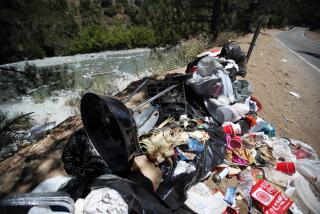Back to a Wasteful Future for E. Germans : Ecology: Under coercion, an individual environmental ethic was developed under Stalinism, something the rush to join the throw-away society threatens.
- Share via
Reports coming out of Eastern Europe in recent months have painted an almost hopeless picture of ecological disaster. The Vistula River is a sewer, the “beautiful blue” Danube is inky black. The mountaintops along the Czech-East German border have been deforested by acid rain. In the soot belt stretching through southern Poland, northern Czechoslovakia and into East Germany, hundreds of industrial plants continue to belch noxious plumes of nitrogen oxide and sulfur into the air. In big industrial centers like Leipzig and Nowa Huta, life expectancies are five to eight years less than in surrounding regions.
Yet this undifferentiated portrayal of ecological squalor has clouded an important dichotomy that had emerged under Stalinist socialism: While the state ignored the environmental costs of economic growth with impunity, individuals were compelled to recycle and husband scarce resources. This environmental ethic was forced; it was not based on noble concern for the planet, but on the daily reality of scarce resources. Yet the result was a narrow personal attention to aspects of one’s own immediate environment.
In East Germany, for example, which may claim the black honor of being the most polluted country in the world, an extensive system of recycling had been established. While East German factories were spewing soot, smog and gases into the air, killing East German lakes, rivers and forests, and poisoning the ground, East German citizens brought paper, scrap metal, glass and plastic to more than 16,000 recycling points scattered throughout a country the size of Virginia.
This one exception to East Europe’s dismal environmental poverty is now also likely to vanish in the aftermath of the revolutions of 1989. The people of East Europe believe that they are now free at last--finally free to catch up with their idealized version of the Western life style, free to savor the throwaway society.
As a result, Europe’s divisions remain. Just as the West is beginning to look for ways to adapt to a 21st-Century model of a sustainable society, East Europeans are yearning, understandably, for the material comforts reaped by the West during the past half century. While Western environmentalists are shifting the burden of saving the environment from polluting industries to individual citizens, many East European citizens are all too ready to abandon the individual environmental ethic that had been developed under some totalitarian regimes in favor of the attributes of material success in the West. They are demanding more cars, more energy-burning appliances, more material comforts, more things.
Just as East Europe’s new bourgeois governments and managers begin to recognize that economic and ecological renewal must go hand in hand, the proletariat, which threw the parties of the working class out of power, is now fearing that ecological perestroika will throw them out of their jobs. As a result, they are likely to resist government efforts to demand new personal sacrifices in the name of the environment. The Green parties of Eastern Europe have been relegated to the back benches of the new democracies.
In the West, personal responsibility for recycling and resource management is increasingly being regarded as modern, “progressive.” For many in the East, that responsibility was considered part of a “regressive,” totalitarian system, something to be abandoned. Far too many want to join the ethos of an earlier Western age, in which waste had become associated with progress.
Wind-borne acid rain, water-borne pollution, and the resource drain of an unreformed Eastern Europe are decisive reasons why the West shares the environmental consequences of Stalinism. The challenge is clear. Environmental assistance and ecological criteria for Western investment and aid will be necessary, yet not sufficient for ecological perestroika in the East.
A new environmental consciousness is not likely to take hold in Eastern Europe unless the citizens of those countries make the millions of individual decisions that sustain such a new ethos. This requires Western engagement at the popular level. East Europeans need to vault from their current predicament, based on outmoded principles of the fading century, into a society sustainable in the next century, without going through the phase of “waste as progress” associated with the Western economic boom of the postwar years.
During the revolutions of 1989, East Europeans empowered themselves. They showed that individual actions could produce results. Faced now with the economic and environmental consequences of the past, they have an opportunity, with Western help at a very individual level, to carry on their revolution.
More to Read
Sign up for Essential California
The most important California stories and recommendations in your inbox every morning.
You may occasionally receive promotional content from the Los Angeles Times.













